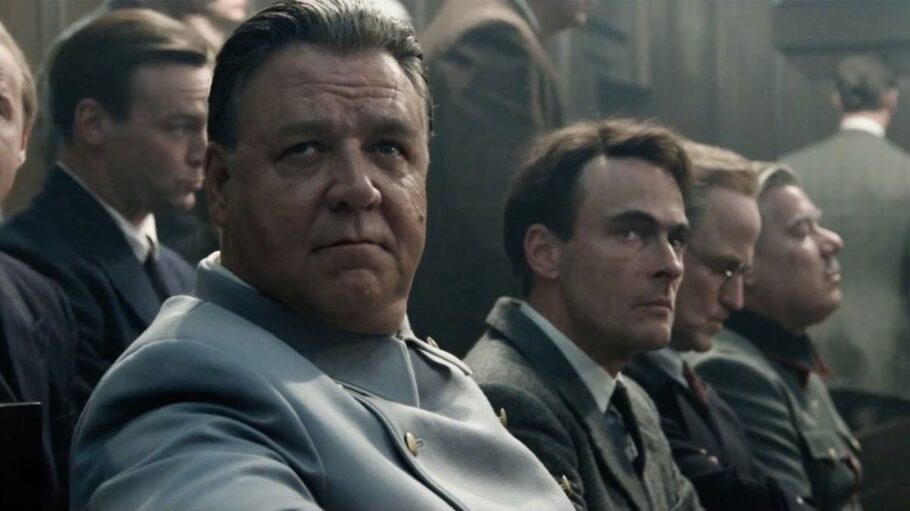In “Nuremberg,” Russell Crowe, portly and imposing, with slicked-back hair, a head that seems to melt into his body, and a low-voiced German accent that expresses implacable self-satisfaction, plays Hermann Göring, second in command of the Nazi regime, just after his surrender at the end of World War II. Göring, along with 21 other members of the Nazi high command, gets taken to a prison in Nuremberg, where he’ll stand trial for war crimes in the first such international tribunal in history. Given the fate that likely awaits him (his crimes will be held up to the light for the world to see; his prosecutors will seek the death penalty), Göring exudes a very unruffled sense of well-being. The point seems to be that the Nazi leaders, among other things, were pathological narcissists, and that this is what narcissism can lock you into: a state of unreal self-belief. (Göring, like Hitler, is also a drug addict, one who takes 40 opiate pills a day. That, too, has a way of tamping down on self-doubt.)
Göring will be questioned in court by members of the International Military Tribunal, all representing the Allies who defeated Germany. But in “Nuremberg,” before the trial begins, his principal interrogator is U.S. Lieutenant Colonel Douglas Kelley (Rami Malek), a psychiatrist whose ostensible purpose is to determine whether Göring is fit to stand trial. It’s obvious from minute one, though, that he’s more than fit. Really, what Kelley seeks to explore — and what the audience wants him to explore — is the nature of evil, which is to say Göring’s relationship to his own crimes. And on that score, neither he nor the movie get very far.
Kelley susses out that Göring is pretending not to understand or speak English, and for a couple of scenes that gives the shrink a leg up. (Crowe learned a lot of dialogue in German, but it isn’t long before Göring drops this charade.) Yet when Kelley confronts Göring with what the Nazis did, Göring’s defense is simple: He didn’t know. He thought the “work camps” were…work camps. (It was Heinrich Himmler, Hitler’s number three, who more directly oversaw the Holocaust.) In his egomaniacal way, Göring is a lot like the infamous Adolf Eichmann (who wouldn’t be apprehended and put on trial until 1960), spinning out an elaborate lawyerly scenario of denial. That’s the brick wall that Kelley is up against. In a way, “Nuremberg” is up against it too.
The film is two-and-a-half hours long, and it’s very much an old-school Oscar movie, full of stately studio staging (the bombed-out ruins, the creamy dark-toned courtroom, the name actors playing important people from history). Written and directed by James Vanderbilt, who has a rather eclectic resume (his most prominent credits are writing the screenplays for “Zodiac” and “The Amazing Spider-Man”), it feels like the most prestigious Hollywood WWII drama of 1988. The film presents itself as lavishly somber and important and includes several not-so-veiled references to the rise of intolerance, and the need to maintain international standards of justice, in the world today.
But “Nuremberg,” competent and watchable as it is, isn’t big on psychological tension or insight. It’s supposed to be an irony that Göring and Kelley become “friends,” or at least that they establish an intimate intellectual bond, sort of like Clarice Starling and Hannibal Lecter. But Rami Malek, while he brings a conversational energy to the role, also brings a weird insecurity; along the way, his Kelley almost seems to forget what his job is. Crowe acts with consummate command even as Göring, by design, keeps the audience at arm’s length.
At one point, footage from the concentration camps is shown at the trial — presented to the world for the first time — and watching “Nuremberg” we see the actual, hideous documentary footage (piles of corpses, a walking human skeleton), which felt a bit jarring to me in such a glossy conventional awards-bait context. Michael Shannon is very good as Robert H. Jackson, the Supreme Court justice who heads up the prosecution, and his Jackson seems up to the challenge…until he puts Göring on the stand and fumbles the ball. He allows Göring to make the case that what he thought he was doing was solving “the Jewish question” by simply having all the Jews of Germany emigrate. (A nice Final Solution.) It’s up to Sir David Maxwell-Fyfe (Richard E. Grant), the British prosecutor, to take the reins and finally ask Göring a question that provokes a “You can’t handle the truth!” response — namely, having watched the concentration-camp footage, would he still swear fealty to Hitler? Göring says that he would. Thus sealing his death sentence.
The movie tries to leave us with the message that the Nazis shouldn’t be viewed as larger-than-life; they were human beings. But the film’s whole conception of Hermann Göring is that he kind of was larger-than-life. Unlike Jonathan Glazer’s “The Zone of Interest,” “Nuremberg” never truly lays bare the man behind the evil myth.
Love Film & TV?
Get your daily dose of everything happening in music, film and TV in Australia and abroad.
From Variety US































